
|
Astronomy Picture Of the Day (APOD)
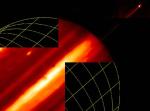 Jupiter: Moon, Ring, and Clouds
Jupiter: Moon, Ring, and Clouds
20.11.1997
An inner moon, an edge-on, planet-girdling ring, and high altitude cloud bands are visible in this mosaic of infrared images of gas giant Jupiter. The moon Metis, 25 miles wide and about 80,000 miles from the planet, is the bright spot at the upper right.
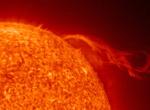 Escape From The Sun
Escape From The Sun
19.11.1997
Twisted magnetic fields arching from the solar surface can trap ionized gas, suspending it in huge looping structures. These majestic plasma arches are seen as prominences above the solar limb. On September 14, this...
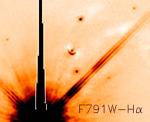 Diffraction Spikes: When Stars Look Like Crosses
Diffraction Spikes: When Stars Look Like Crosses
18.11.1997
Unusual appendages around bright stars are commonplace, but never seem to be mentioned. What are they? First, a telescope brings starlight falling over a large area to a small area. To get at this...
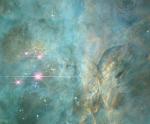 In the Center of the Trapezium
In the Center of the Trapezium
17.11.1997
Start with the constellation of Orion. Below Orion's belt is a fuzzy area known as the Great Nebula of Orion or M42. In this nebula is a bright star cluster known as the Trapezium, shown above. New stellar systems are forming there in gigantic globs of gas and dust known as Proplyds.
 Barringer Crater on Earth
Barringer Crater on Earth
16.11.1997
What happens when a meteor hits the ground? Usually nothing much, as most meteors are small, and indentations they make are soon eroded away. 49,000 years ago, however, a large meteor created Barringer Meteor Crater in Arizona, pictured above. Barringer is over a kilometer across.
 The Leonid Meteor Shower
The Leonid Meteor Shower
15.11.1997
The Leonid Meteor Shower will likely reach its peak in the early hours this Monday morning. Though the Moon will be bright, Leo, the shower's radiant point, will be well above the eastern horizon from Western North America and the Pacific region during this period.
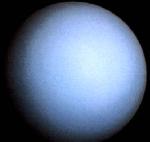 Uranus: The Tilted Planet
Uranus: The Tilted Planet
14.11.1997
Uranus is the third largest planet after Jupiter and Saturn. This picture was snapped by the Voyager 2 spacecraft in 1986 - the only spacecraft ever to visit Uranus. Uranus has many moons and a ring system. Uranus is composed mostly of rock and ices, but with a thick hydrogen and helium atmosphere.
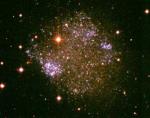 Irregular Galaxy Sextans A
Irregular Galaxy Sextans A
13.11.1997
Grand spiral galaxies often seem to get all the glory. Their newly formed, bright, blue star clusters found along beautiful, symmetric spiral arms are guaranteed to attract attention. But small irregular galaxies form stars too, like this lovely, gumdrop-shaped galaxy, Sextans A.
 Mars: A Sheer Close Up
Mars: A Sheer Close Up
12.11.1997
As the Mars Global Surveyor spacecraft maneuvers toward its final mapping orbit, its cameras have been producing some sharp views of Mars. At a resolution of better than 30 feet per pixel, this image...
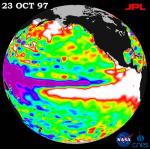 El Nino Earth
El Nino Earth
11.11.1997
El Niño is a temporary global climate change resulting from unusually warm water in the central Pacific Ocean. El Niño can cause unusual or severe weather for some locations over the next few months.
|
January February March April May June July August September October November December |
|||||||||||||||||||||||||||||||||||||||||||||||||